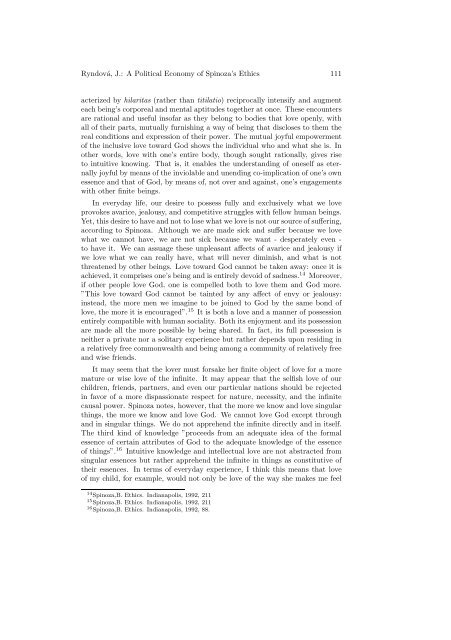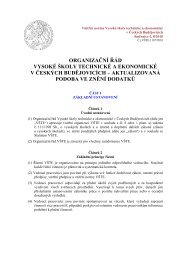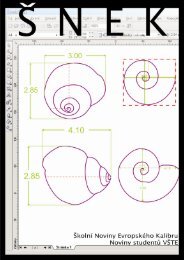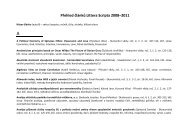Untitled - Vysoká Å¡kola technická a ekonomická v Äeských ...
Untitled - Vysoká Å¡kola technická a ekonomická v Äeských ...
Untitled - Vysoká Å¡kola technická a ekonomická v Äeských ...
You also want an ePaper? Increase the reach of your titles
YUMPU automatically turns print PDFs into web optimized ePapers that Google loves.
Ryndová, J.: A Political Economy of Spinoza’s Ethics 111acterized by hilaritas (rather than titilatio) reciprocally intensify and augmenteach being’s corporeal and mental aptitudes together at once. These encountersare rational and useful insofar as they belong to bodies that love openly, withall of their parts, mutually furnishing a way of being that discloses to them thereal conditions and expression of their power. The mutual joyful empowermentof the inclusive love toward God shows the individual who and what she is. Inother words, love with one’s entire body, though sought rationally, gives riseto intuitive knowing. That is, it enables the understanding of oneself as eternallyjoyful by means of the inviolable and unending co-implication of one’s ownessence and that of God, by means of, not over and against, one’s engagementswith other finite beings.In everyday life, our desire to possess fully and exclusively what we loveprovokes avarice, jealousy, and competitive struggles with fellow human beings.Yet, this desire to have and not to lose what we love is not our source of suffering,according to Spinoza. Although we are made sick and suffer because we lovewhat we cannot have, we are not sick because we want - desperately even -to have it. We can assuage these unpleasant affects of avarice and jealousy ifwe love what we can really have, what will never diminish, and what is notthreatened by other beings. Love toward God cannot be taken away: once it isachieved, it comprises one’s being and is entirely devoid of sadness. 14 Moreover,if other people love God, one is compelled both to love them and God more.”This love toward God cannot be tainted by any affect of envy or jealousy:instead, the more men we imagine to be joined to God by the same bond oflove, the more it is encouraged”. 15 It is both a love and a manner of possessionentirely compatible with human sociality. Both its enjoyment and its possessionare made all the more possible by being shared. In fact, its full possession isneither a private nor a solitary experience but rather depends upon residing ina relatively free commonwealth and being among a community of relatively freeand wise friends.It may seem that the lover must forsake her finite object of love for a moremature or wise love of the infinite. It may appear that the selfish love of ourchildren, friends, partners, and even our particular nations should be rejectedin favor of a more dispassionate respect for nature, necessity, and the infinitecausal power. Spinoza notes, however, that the more we know and love singularthings, the more we know and love God. We cannot love God except throughand in singular things. We do not apprehend the infinite directly and in itself.The third kind of knowledge ”proceeds from an adequate idea of the formalessence of certain attributes of God to the adequate knowledge of the essenceof things”. 16 Intuitive knowledge and intellectual love are not abstracted fromsingular essences but rather apprehend the infinite in things as constitutive oftheir essences. In terms of everyday experience, I think this means that loveof my child, for example, would not only be love of the way she makes me feel14 Spinoza,B. Ethics. Indianapolis, 1992, 21115 Spinoza,B. Ethics. Indianapolis, 1992, 21116 Spinoza,B. Ethics. Indianapolis, 1992, 88.








